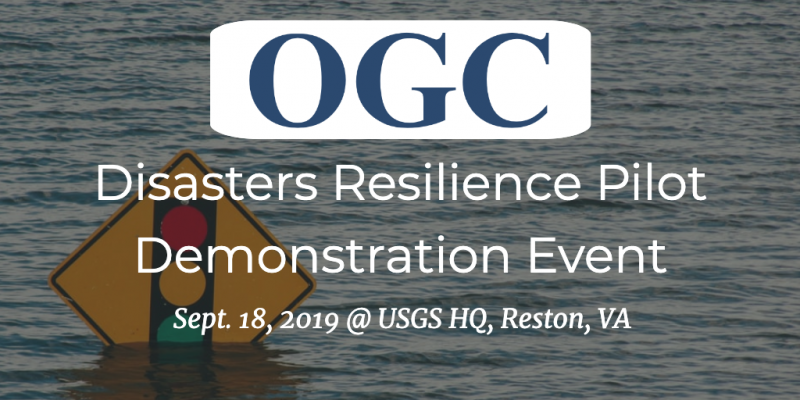Getting the Right Information to the Right Person at the Right Time

The Open Geospatial Consortium (OGC) invites anyone who provides and/or uses geospatial data or products for disaster planning and response to the Disasters Resilience Pilot Demonstration Event, to be held Wednesday, September 18, 2019 at USGS Headquarters, Reston, VA.
In all aspects of disaster management and response, the effective sharing of geospatial information, through the power of interoperability, has been proven effective to help save lives, limit damage, and reduce costs – especially important as disasters are becoming more frequent and more costly, with over a trillion dollars in the US being lost during the previous decade alone. During times of disaster preparation, geospatial data is used to identify at-risk areas. In the wake of a crisis, geospatial data, including near real-time imagery, is used to assess and contextualize damage as well as coordinate response teams.
However, the ability to effectively share, use, and re-use geospatial information and applications across and between governments and Non-Government Organizations (NGOs) in support of disaster response and resilience is dependent upon having the required partnerships, policies, standards, architecture, and technologies in-place. Further, building reusable workflows, geospatial information, applications, and partnerships usable across multiple disaster responses – those that are geographically separate but in the same regional area – requires a sustained commitment. Conversely, maintaining such a commitment would enable stakeholders to further mature and strengthen their efforts towards resilience, preparedness, response, and mitigation.
The goal of the Disasters Resilience Pilot was to develop and test reliable and powerful data infrastructures that make available, in a cost-effective way, all the data required for decision making, analysis, and response in a flooding, landslide, volcano, earthquake, hurricane, wildfire, or other disaster situation.
The demonstration event will show how deeply powerful and useful standards and Spatial Data Infrastructure (SDI) are when used by the Disasters community. It will show accessing and integrating geospatial information from different sources providing the right information to the right person at the right time. In addition, to improve disaster planning and response capability, User Guides (Cookbooks) will be provided to support developers, analysts, and other disasters stakeholders.
To register for the September 18, 2019 demonstration event, please visit the Disasters Resilience Pilot Demonstration Event page. This Pilot builds on previous work executed as the Disasters Interoperability Concept Development Study (CDS) and documented in the OGC Development of Disaster Spatial Data Infrastructures for Disaster Resilience report.
About OGC
The Open Geospatial Consortium (OGC) is an international consortium of more than 530 businesses, government agencies, research organizations, and universities driven to make geospatial (location) information and services FAIR – Findable, Accessible, Interoperable, and Reusable.
OGC's member-driven consensus process creates royalty free, publicly available geospatial standards. Existing at the cutting edge, OGC actively analyzes and anticipates emerging tech trends, and runs an agile, collaborative Research and Development (R&D) lab that builds and tests innovative prototype solutions to members' use cases.
OGC members together form a global forum of experts and communities that use location to connect people with technology and improve decision-making at all levels. OGC is committed to creating a sustainable future for us, our children, and future generations.
Visit ogc.org for more info on our work.
“
